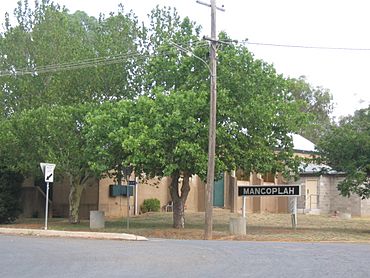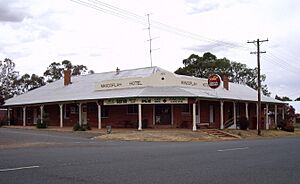Mangoplah facts for kids
Quick facts for kids MangoplahNew South Wales |
|
|---|---|

Mangoplah Hall
|
|
| Population | 309 (2016 census) |
| Established | 1850's |
| Postcode(s) | 2652 |
| Elevation | 276 m (906 ft) |
| Time zone | AEST (UTC+10) |
| • Summer (DST) | AEST (UTC+11) |
| Location |
|
| LGA(s) | City of Wagga Wagga |
| County | Mitchell |
| State electorate(s) | Wagga Wagga |
| Federal Division(s) | Riverina |
Mangoplah (pronounced like man-go-plah) is a small town in New South Wales, Australia. It's about 36 kilometres (22 mi) south of a bigger city called Wagga Wagga. This area is known as the Riverina region.
In 2016, about 309 people lived in Mangoplah. The town's name is thought to come from the Wiradjuri language, an Aboriginal language. It might mean "Koori people singing."
Contents
History of Mangoplah
Mangoplah has an interesting past with many important events.
Early Developments
The first bridge in Mangoplah was built in 1862. The government of New South Wales provided £700 for its construction. This bridge crossed Phillitop and Old Man Creek.
In 1865, some government land in Mangoplah was set aside for public use. It was given to the Wesleyan Church.
Local Businesses and Events
In 1866, Thomas Jones ran the Mangoplah Inn, a local hotel. Mrs. Ann Hyland bought it in 1868. Around 1880, the inn became known as Richard Curry's Mangoplah Inn.
During the 1860s and 1870s, Mangoplah used to host horse races every year. These races took place in January, on the anniversary of the colony's founding. They were held at Mrs. Hyland's Mangoplah Inn.
The Mangoplah Post Office first opened on September 1, 1880. It closed in 1885 but then reopened in 1911.
Gold Discoveries
In 1880, a very rich gold deposit was found in Mangoplah. Many people marked out areas to dig for gold.
Later, in 1913, more gold mining happened at a property called Warbling Springs. Miners dug three shafts, each about 100 feet deep. They found a 10-foot-thick layer of rock that showed a lot of gold.
Community and Education
The Mangoplah Football Club played its first recorded game of Australian rules football in August 1913. They played against a team from Cookardinia.
The Mangoplah School opened its doors in 1914. A year later, in 1915, three tennis courts were built at the Mangoplah Recreation Reserve. The North Mangoplah School was also finished that year.
Railway and Modern Buildings
Construction of a new railway line from The Rock to Mangoplah began in 1923. The Mangoplah Railway Station operated from 1925 until 1956. A big bushfire in 1952 badly damaged the station, which eventually led to its closure.
The Mangoplah Hotel, a new pub, was built in 1924 by Sam Heron. A large grain silo, used for storing crops, was also built in 1924.
St. Mark's Church of England Church opened in 1926. Dr. Halse, the Bishop of Riverina, officially opened it.
Mangoplah Today
Today, Mangoplah is a small but active community.
The town has a pub, a community hall, and two churches. There's also a recreation reserve where people can play sports. The town has a football and netball club, a general store, and a business that sells farm supplies. The primary school in Mangoplah closed in 2013.
Mangoplah is located about 10 kilometres (6.2 mi) west of Livingstone National Park. This park is a great place to explore nature.
 | Madam C. J. Walker |
 | Janet Emerson Bashen |
 | Annie Turnbo Malone |
 | Maggie L. Walker |



